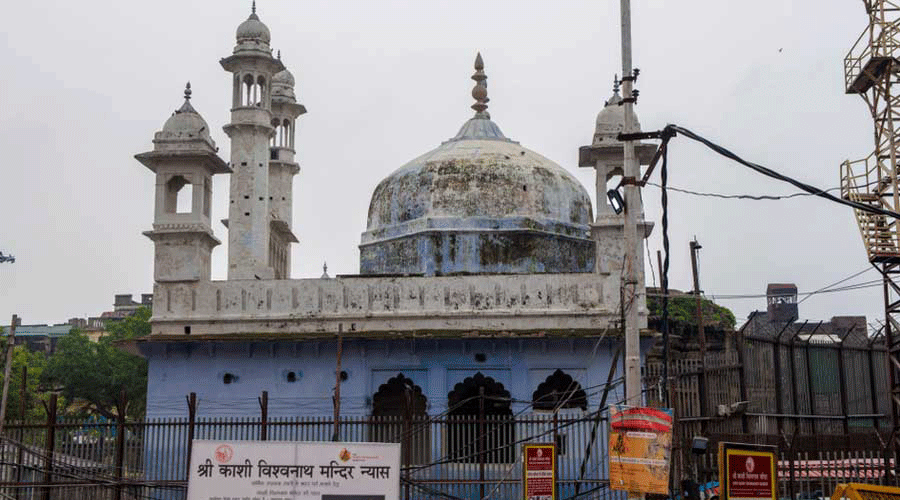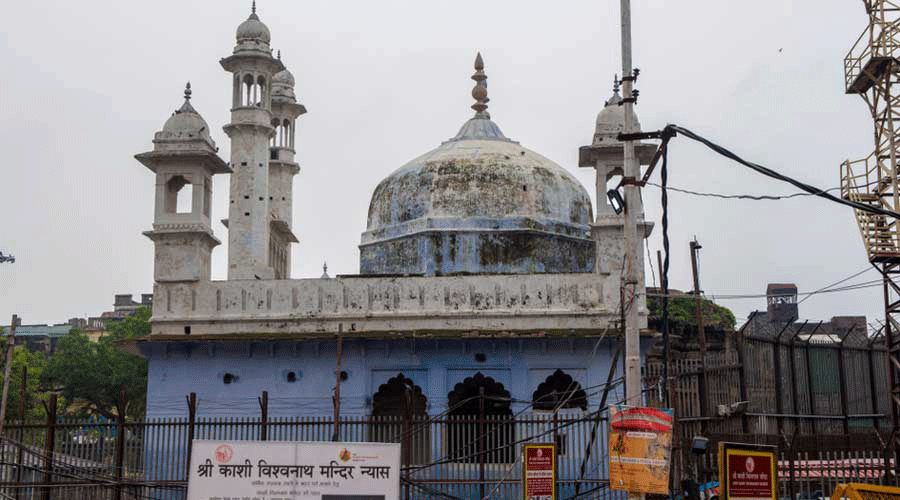Over 400 academics and activists from India and abroad have condemned the “heckling” of a Dalit teacher, allegedly by ABVP members, over his comment during an online discussion about Varanasi’s Gyanvapi mosque that has been the subject of divisive politics.
Ravi Kant, associate professor of Hindi at Lucknow University, reportedly had to take shelter at the proctor’s office for several hours on Tuesday after a group of students and alleged outsiders surrounded him on the campus and shouted slogans aggressively in his face.
Some media reports said the hecklers chanted a well-known, expletive-laced slogan that ends with “shoot the traitors” and has been used by BJP leaders in divisive poll campaigns.
A student has lodged an FIR against Kant under penal sections dealing with promoting enmity on grounds of religion, insult with intent to provoke breach of peace, and promoting enmity, hatred or ill-will between classes.
Right-wing trolls have launched a social media campaign against Kant, circulating a video clip that the statement by academics and activists says leaves out key parts of Kant’s comments and amounts to “manipulation”. They have sought protection for Kant and his family and punishment of those who heckled him.
Among the signatories are Ratan Lal Hangloo, former vice-chancellor of Allahabad University; Pratyush B, a professor at the University of Massachusetts; Ramesh Dixit, a retired professor from the University of Lucknow; Amrit Singh, a professor from Ohio University; and Aniket Basu, a Calcutta University professor.
Kant’s comment came during a discussion on an online channel, Satya Hindi, on Monday. He had cited a story on the Gyanvapi mosque – which stands adjacent to the Kashi Vishwanath temple --- narrated by freedom fighter and politician Pattabhi Sitaramayya in his book Feathers and Stones.
“In Feathers and Stones, Sitaramayya has given the story,” Kant said, stressing that it was a story. He then narrated the story that when Aurangzeb was passing through Kashi, one of the queens accompanying him was reported missing and was later found in the sanctum sanctorum. She had been raped.
“This enraged Aurangzeb. He ordered its (temple’s) destruction. The same queen did not favour destruction of the temple and wanted its reconstruction. But Aurangzeb said that rebuilding the temple was no longer possible, but building a mosque was possible.”
It appears that the story about the rape --- which also implies that Aurangzeb ordered the demolition not from religious bigotry but from a sense of outrage --- angered the Right wing.
Sangh parivar outfits have for decades insisted that Aurangzeb had demolished the original Kashi Vishwanath temple and got the mosque built. In a throwback to the Ayodhya movement, they want the Gyanvapi shifted. Several petitions on the issue are pending in various courts.
Recently, a petition seeking round-the-year worshipping rights at a raised platform, engraved with purported figures of Hindu gods and goddesses, inside the Gyanvapi premises has opened another battle line.
The academics’ statement underlines that Kant had qualified his remarks by saying it was only a story but the circulating video clips have edited this part as well as his reference to the book.
“Dr Ravi Kant, while making this reference, was careful to emphasise that this narrative could only be called a ‘story’, as its author did not cite any source in support,” the statement by academics and activists says.
“Nevertheless, within less than twenty-four hours of these remarks, a maliciously edited extract of his comment was circulated online which, by the next morning, snowballed into a violent protest which has created a grave threat to Dr Ravi Kant’s safety.
“We are deeply distraught by the continued intimidation of Dr Ravi Kant and the manipulation of his comments, despite his clarifications about the context of his reference to this story and even his expression of regret at any hurt that the incident may have caused to those misled by the video clips circulated online.”
The statement said there was talk of the university disciplining Kant for his comments at the online discussion and his social media posts that said he had feared for his life when surrounded by the mob.
“…Our horror is doubled by the fact that these conditions of violence and intimidation obtain in a university… where critical examination of opinions and ideas is the norm, and where violence and intimidation should have no place whatsoever,” the statement said.
Kant has in a video statement said he is being targeted because he is a Dalit.
“I made a statement quoting a story from a book about how the mosque came to be constructed in Varanasi. That statement and the reference to the book was edited out and a clip shared suggesting I was hurting Hindu sentiments. I had no such intention. I was merely referring to a story, not even a factual account,” Kant was quoted as saying.
“Despite this, students of the ABVP and outsiders came here and raised objectionable slogans. With the help of police, I spoke to the students and asked them to see the whole clip and expressed regret if anyone’s sentiments were hurt…. I am a Dalit… and I feel my voice is being suppressed, being from this community.”
Dixit, one of the signatories to the academics’ statement, said academics were free to cite any text for reference and that if some people resorted to vandalism in the name of hurt sentiments, it would be difficult to conduct teaching and research.
Vishwa Mohan Jha, an associate professor of history at the ARSD College under Delhi University, said the plea of hurt sentiments was used selectively.
“When Delhi’s roads are renamed after dropping the names of Mughal kings, that can also be hurtful to many. But the ‘hurt sentiment’ (pretext) is invoked in particular type of cases…. It is used arbitrarily,” Jha said.











